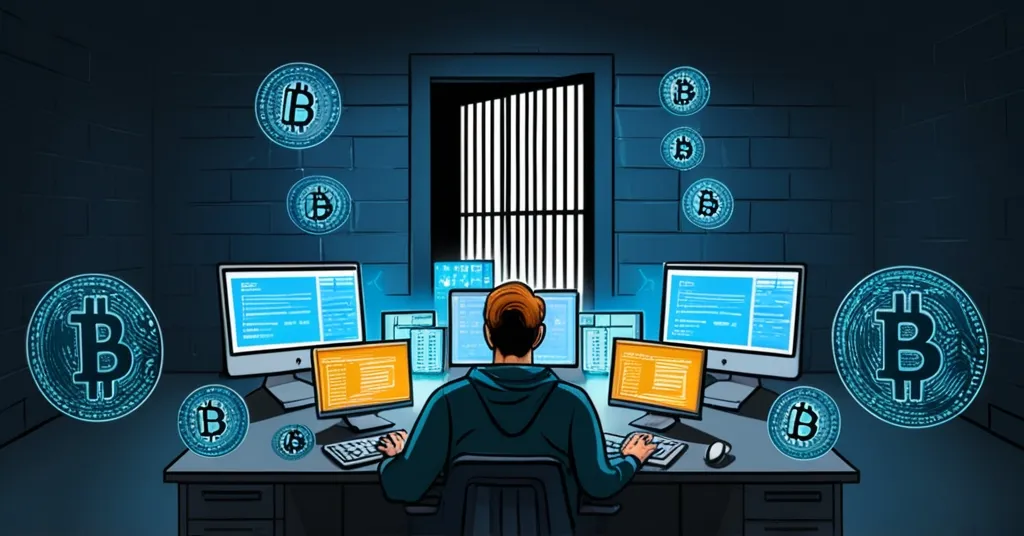22-Year-Old’s $37M Crypto Heist from Basement Leads to 20-Year Prison Sentence

From Indiana Basement to Federal Prison: 22-Year-Old Sentenced for $37 Million Crypto Heist
22-year-old Evan Frederick Light sentenced to 20 years for $37 million crypto theft.
Operated from his mother’s basement, targeting retirement savings.
Guilty of conspiracy to commit wire fraud and money laundering.
From a quiet basement in Indiana, a young man’s audacious $37 million crypto heist has landed him a 20-year sentence. How did a 22-year-old from Lebanon, Indiana, manage to steal such a massive amount in digital assets? This case is a stark reminder of the darker side of the cryptocurrency world, where the promise of financial freedom can be exploited by those with malicious intent.
The Crime
Evan Frederick Light, operating from his mother’s basement, illegally accessed an investment firm in Sioux Falls, South Dakota. He stole personal information and digital assets, affecting over 600 victims worldwide. The audacity of executing such a high-stakes operation from a basement might sound like a plot from a B-movie, but the real-world consequences are far from fiction. Light’s methods involved phishing attacks to gain unauthorized access to the platform. He then used mixing services, which blend cryptocurrencies to obscure their origins, and online gambling websites to further confuse the trail of the stolen assets. His actions led to significant financial losses for victims, many of whom were relying on their investments for retirement.
The Investigation
The FBI Minneapolis, led by Special Agent in Charge Alvin Winston Sr., was hot on Light’s trail. Using advanced blockchain analysis tools, they were able to track and recover a significant portion of the stolen cryptocurrency. This case showcases the increasing effectiveness of law enforcement in tackling cybercrimes.
The Conviction
The court, presided over by Judge Roberto Lange, found Light guilty of conspiracy to commit wire fraud and conspiracy to launder monetary instruments. In addition to his 20-year sentence, Light will undergo three years of supervision upon release and has been ordered to pay a $200 special assessment along with approximately $37 million in restitution.
Assistant United States Attorney Jeremy R. Jehangiri prosecuted the case, and United States Attorney Alison Ramsdell emphasized the gravity of Light’s actions, stating,
“His 20-year sentence demonstrates the severity of his crime and its impact on the hundreds of victims whose lives have been devastated by his fraudulent activity.”
Alvin Winston Sr. added,
“Today’s sentencing makes clear that cybercriminals who believe they can operate from the shadows without consequence are mistaken. The FBI, alongside our partners, will continue to investigate and dismantle these schemes to ensure justice is served and the public remains protected.”
Broader Implications
This incident sheds light on the darker side of the cryptocurrency world, where the promise of decentralization and financial freedom can be exploited by those with malicious intent. While Bitcoin and other cryptocurrencies continue to push the boundaries of financial innovation, cases like Light’s remind us of the critical need for robust security measures and vigilance against cyber threats.
As advocates for decentralization and privacy, it’s crucial to acknowledge that while the technology itself is not to blame, the anonymity it offers can be a double-edged sword. The crypto community must continue to champion security and education to protect users from falling prey to similar scams. The broader implications of this case for the cryptocurrency sector are significant. It underscores the necessity for enhanced cybersecurity protocols and highlights the increasing sophistication of law enforcement in tracking and prosecuting digital crimes. The shift towards using stablecoins in illicit transactions, as noted in recent reports, further complicates the landscape, requiring ongoing vigilance and adaptation.
However, it’s worth noting that the crypto space isn’t solely a breeding ground for criminal activity. Cryptocurrencies are also being used for legitimate purposes, from remittances to smart contracts, highlighting the technology’s potential to revolutionize finance. While we must confront the challenges head-on, we should also celebrate the opportunities that Bitcoin and other cryptocurrencies offer for financial inclusion and disruption of traditional finance.
Key Takeaways and Questions
- What was the total amount stolen by Evan Frederick Light?
Approximately $37 million in digital assets.
- How long was Evan Frederick Light sentenced to prison?
20 years in federal prison, followed by three years of supervision.
- What crimes was Evan Frederick Light convicted of?
Conspiracy to commit wire fraud and conspiracy to launder monetary instruments.
- How did Evan Frederick Light carry out the heist?
By illegally accessing an investment firm’s platform in Sioux Falls, South Dakota, through phishing attacks, stealing personal information and digital assets, and then using mixing services and online gambling websites to obscure the trail.
- What role did the FBI play in this case?
The FBI conducted the investigation, using blockchain analysis tools to recover a significant portion of the stolen cryptocurrency, and worked with the Attorney General’s office to prosecute Light.
- What are the broader implications of this case for the cryptocurrency sector?
It underscores the need for enhanced cybersecurity measures and highlights the ability of law enforcement to track and prosecute cybercrimes, emphasizing the risks associated with digital assets.
While we celebrate the potential of cryptocurrencies to disrupt traditional finance and empower individuals, we must also confront the challenges head-on. The crypto space is not just about moonshots and lambos; it’s about building a secure and resilient ecosystem that can withstand the attacks of those who seek to exploit it. Let’s keep pushing forward, but with our eyes wide open.



